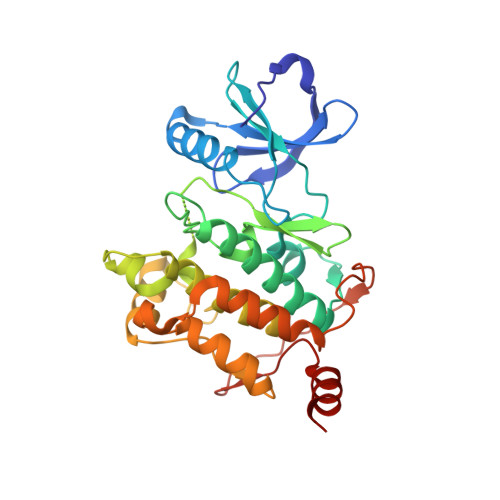Takinib, a Selective TAK1 Inhibitor, Broadens the Therapeutic Efficacy of TNF-alpha Inhibition for Cancer and Autoimmune Disease.
Totzke, J., Gurbani, D., Raphemot, R., Hughes, P.F., Bodoor, K., Carlson, D.A., Loiselle, D.R., Bera, A.K., Eibschutz, L.S., Perkins, M.M., Eubanks, A.L., Campbell, P.L., Fox, D.A., Westover, K.D., Haystead, T.A.J., Derbyshire, E.R.(2017) Cell Chem Biol 24: 1029-1039.e7
- PubMed: 28820959
- DOI: https://doi.org/10.1016/j.chembiol.2017.07.011
- Primary Citation of Related Structures:
5V5N - PubMed Abstract:
Tumor necrosis factor alpha (TNF-α) has both positive and negative roles in human disease. In certain cancers, TNF-α is infused locally to promote tumor regression, but dose-limiting inflammatory effects limit broader utility. In autoimmune disease, anti-TNF-α antibodies control inflammation in most patients, but these benefits are offset during chronic treatment. TAK1 acts as a key mediator between survival and cell death in TNF-α-mediated signaling. Here, we describe Takinib, a potent and selective TAK1 inhibitor that induces apoptosis following TNF-α stimulation in cell models of rheumatoid arthritis and metastatic breast cancer. We demonstrate that Takinib is an inhibitor of autophosphorylated and non-phosphorylated TAK1 that binds within the ATP-binding pocket and inhibits by slowing down the rate-limiting step of TAK1 activation. Overall, Takinib is an attractive starting point for the development of inhibitors that sensitize cells to TNF-α-induced cell death, with general implications for cancer and autoimmune disease treatment.
- Department of Pharmacology and Cancer Biology, Duke University, Durham, NC 27710, USA.
Organizational Affiliation:

















